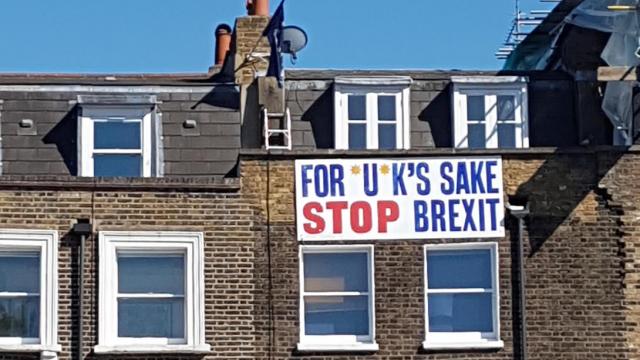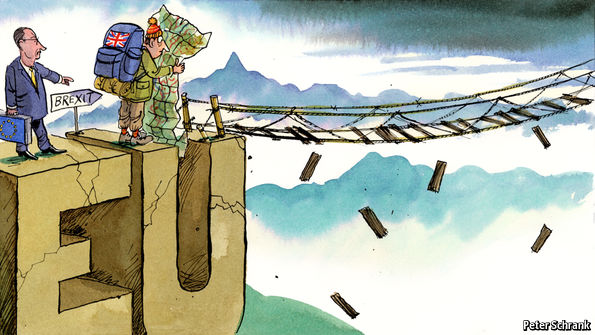
In a week of exceptional high drama even by Brexit’s standards, March 13 saw Members of Parliament vote to push the prospect of Britain leaving the E.U. without a deal off the table.
The vote to reject a no-deal Brexit was marginal, swinging a mere four votes against the no-deal scenario. The next day saw the House of Commons vote for a Brexit delay but reject the possibility of a second referendum. How far a delay remains uncertain.
Prime Minister Theresa May might have breathed a sigh of relief that the prospect of a Brexit delay means she now has ammunition to go back to parliament with her feeble Chequers Deal, for the third time, and try to convince them it’s the only way to ensure Brexit actually happens. The rejection of a no-deal left the government crestfallen, as its attempt to keep control of the Brexit process by maintaining a no-deal on the table was quashed.
Wanting to keep the long-term no-deal option a possibility, May ordered Tory MPs to vote against the amendment with a three-line whip. With four of her cabinet members abstaining from the order, the result was “fresh humiliation” for the government.
In the immediate wake of the no-deal rejection vote, the value of the pound, which has been nosediving ever since the U.K. voted to leave the E.U. in 2016, momentarily picked up, with the nation’s outlook looking a little rosier as a no-deal was seemingly off the table.
However, as Conservative MP Jacob Rees-Mogg – a staunch Brexiteer and chairman of the Brexit European Research Group (ERG), which has long been plotting to oust May – was quick to point out, the vote is not binding and under current law Britain could still leave without a deal on March 29.
Economic fallout
The consequences of Britain exiting the European Union without securing a deal have long been cited as being potentially crippling and catastrophic to the country.
Last month, Bank of England’s Governor Mark Carney warned a no-deal Brexit would be an “economic shock” for the country’s economy and would send “a signal globally about the prospects of refounding globalization.”
In the run-up to last week’s dramatic vote in the House of Commons, more than a dozen major charities urged Theresa May to safeguard food supplies for vulnerable people in the event of a no-deal Brexit.
Church Action on Poverty, the Trussell Trust and FareShare were among the charities to write to the prime minister urging a “hardship fund” put in place to provide food and emergency supplies to help those most affected by the crushing consequences a no-deal scenario – including a potential increase in food prices, given that 70 percent of food imports come from the E.U.
The coalition of charities warned May that services designed to help those living in poverty and the most vulnerable in the U.K. – such as free school dinners, meals on wheels, suppliers to food banks and homeless hostels and refugees – would be adversely affected if food prices rise as a result of Brexit.
The charitable organizations informed the prime minister by letter that “the UN has estimated that 8.4 million people in the U.K. (half of them children) experience household food insecurity – missing meals or unable to afford adequate food.”
“Food price inflation caused by a no-deal Brexit is likely to affect these people and the services providing food to support them, disproportionately.”
The warnings from the U.K.’s leading charities followed earlier threats by the nation’s food industry that it would break off cooperation with the government because of the “catastrophic” risk of a no-deal Brexit.
The leaders of more than 30 trade associations wrote to the environment secretary Michael Gove, informing him that they were unable to “respond to non-Brexit related policy consultations or initiatives.”
Despite these repeated and clear warnings to the government about the crushing effects a no-deal Brexit would have on the nation’s most vulnerable, and the chaos it would bring specifically to the food industry, May and her allies went ahead to whip Conservatives into voting to keep alive the prospect of leaving on March 29, 2019, even without securing a deal.
Fortunately the tactic failed and a slim majority of MPs along with 13 government MPs went against May’s orders.
One such MP was the Work and Pensions Minister Sarah Newton, who defied the whips’ orders to vote against rejecting a no-deal scenario. Newton quickly resigned from her post for what effectively equated to voting against taking Britain’s poorest deeper into poverty just so the Tory government could keep control of the ongoing Brexit fiasco.
From the beginning of the sorrowful Brexit saga, Theresa May has been accused of being held hostage by Brexit hardliners. This latest humiliating defeat for the government shows the extent the prime minister is willing to go to to appease the Brexit die-hards: ordering Tory MPs to vote to keep a no-deal on the table to retain the little power they had over Brexit, irrespective of its shattering consequences to society’s most vulnerable.
But despite the glimmer of optimism the no-deal prevention vote brought to the U.K.’s remain supporters, as Rees-Mogg hastily pointed out, under current law Britain could still leave without a deal at the end of this month.
Even if a no-deal is eradicated from the equation, whatever way Brexit turns out it is likely to make the people of Britain poorer, with those already struggling to make ends meet being hit the hardest.
As the Trade Union Congress (TUC) notes: “The uncertainty over Brexit has hit working people where it hurts most – in their pockets."
“Workers are suffering from the longest wage squeeze in 200 years, with real wages now £18 a week less than they were in 2008. 8.2 million working adults are living in poverty, with 1.3 million food bank packages issued last year alone.
“And since 2016, the U.K. has plummeted down the global growth league. It now sits 39th out of 45 in the OECD list.
“But instead of doing something about this, the Prime Minister has been wasting time trying to convince her own MPs to back her dodgy deal.”
A public sense of relief
Given the dire consequences a no-deal would have on the economy and country, many are, justifiably, aghast May and her allies are scrambling to keep a no-deal prospect alive.
As remainer Rebecca, a teacher living in Sussex, told Occupy.com, “I nervously watched the votes and felt nothing but relief that MPs did the right thing for the country and took a no deal off the table, which would have been catastrophic for us. I can’t believe there’s Brexiteers who want a no deal!”
Celia Birchby, a former headteacher in Cheshire, is equally disapproving, commenting: “May is more interested in keeping the Tories together than prioritizing the people. She doesn’t want to go down in history as the Tory leader that split the party. That is why she is trying so hard to please the ERG.
“She is, in typical Tory fashion, threatening the welfare of the disadvantaged and perpetuating poverty," she added.
This week will see May take her beleaguered Brexit deal to the Commons for its third meaningful vote, armed with a suborning ideology that failing to agree to her deal will lead to a lengthy Brexit delay that could result in “no Brexit at all.”
Yet despite the government’s scaremongering tactics, skepticism is being voiced that May’s deal will be lucky the third time round.
One such thinker is Dr. Andy Pickard, former head of education at Manchester Metropolitan University. “I remain optimistic that once May's third attempt to get her deal through fails, and it has to fail as a bad deal irrespective of the 'back stop', then a 'soft Brexit' will become the leading runner," he told Occupy.com. "I would welcome such a deal being put to country alongside the alternative of remain, on the grounds that it is a constitutional necessity.
"People say Brexit is complicated. It isn't," Pickard added. "There is a majority in parliament and probably the country as a whole for a 'soft Brexit'. This would retain our close economic relationship with the E.U. while stepping outside the political processes which seemed to alarm so many people at the time of the referendum. What makes Brexit complicated is around 100 Conservative MPs, 10 DUP MPs who are totally out of step with their constituencies, and the majority of 150,000 Conservative Party members. The paralysis that the rest of us have endured is because of the government's inability to take these groups on.”














